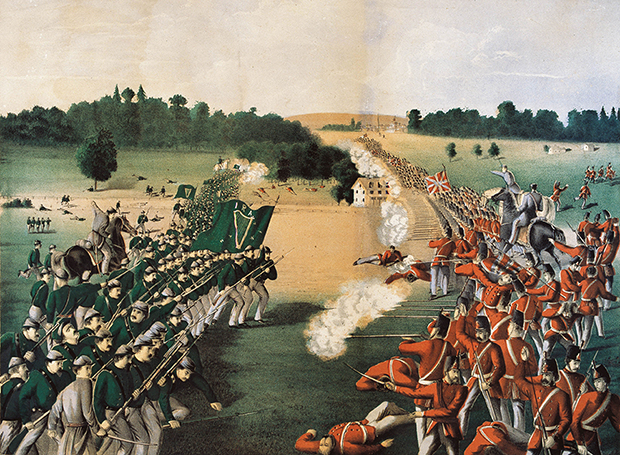Another triumph of failure?
Published in Issue 5 (September/October 2016), News, Volume 24HOW AND WHY CANADIANS CELEBRATE THE 150th ANNIVERSARY OF THE RAID ON RIDGEWAY
By Daniel Panneton
Celebrating historic losses on a national scale is a curious phenomenon. In an interesting parallel to the Easter Rising centenary commemorations in Ireland, this May and June Canadians recognised the 150th anniversary of the Fenian raid on Ridgeway. The raid, which resulted in a military defeat for the provinces, was depicted as a defining moment, central to an emerging sense of Canadian national identity during the era of confederation.
The raid occurred at Ridgeway, close to Niagara Falls, on 2 June 1866. A body of roughly 800 American Civil War veterans, both Union and Confederate, crossed the Niagara River and were met by both Canadian militia and British regulars. The Fenians were under the command of John O’Neill, a former Union Army cavalry commander, who was himself operating under the orders of the Roberts wing of the split Fenian Brotherhood. The assault was the second and largest of the five Fenian raids into Canada, which occurred between 1866 and 1871. The ultimate goal was to seize vital Canadian infrastructure, which could be used as a bargaining chip for Irish independence.
Although Canadian confederation was already a done deal at that point, the panic caused in Canada by the raid (and the writings of subsequent historians) have inextricably linked the two events in popular memory. The raid was the last foreign invasion to occur in Ontario, and the first battle to be fought by an almost entirely Canadian-born force. Canadians were not initially proud of their defeat, which led veterans of the raid to protest their lack of recognition in 1890. The following year, on the 25th anniversary of the raid on Ridgeway, Decoration Day was inaugurated. According to the nation-building narrative that emerged decades after, the raids demonstrated to Canadians their physical vulnerability and provided a compelling argument for union.
In 2016 multiple events were held to commemorate the raid in and around Fort Erie, Ontario. The programme included a battle re-enactment, a parachute drop, period performances, and the first major academic conference on the Fenians to be held in North America. Parades were put on by Canadian military units like the Queen’s Own Rifles of Canada, who trace their origins to the raids, and the Royal Hamilton Light Infantry, while the Ridgeway battlefield itself was rededicated by the federal government. Fort Wellington in Prescott, Ontario, was also the site of an anniversary event, which involved an artillery salute, special guided tours and a ceremony.

Above: An 1869 colour print of the Ridgeway raid, 2 June 1866. (NMI)
The Canadian-infused celebrations at Forts Erie and Wellington in 2016 occurred against the backdrop of a wider, self-conscious shift in tone and message by the Canadian federal government. Between 2005 and 2015, Prime Minister Stephen Harper and his Conservative cabinet promoted a campaign to recast Canadians’ historical perceptions of self. Canadian history was framed as a militaristic march defined by conquest and sacrifice (although curiously not empire). In 2015 Justin Trudeau and the Liberal Party won a majority, quickly declaring their intention ‘to have a government that shows symbols of progressiveness’. As Canada heads into the sesquicentennial of confederation in 2017, and its citizens take a step back to revaluate and draw meaning from the past, events of significance present an opportunity for federal governments to influence national perceptions of self.
The celebration of a military loss, then, stands in marked contrast to the existing conquest narrative. The unprepared Canadian forces, several of whom were university students rushed from their exams, were tactically defeated by the Irish Civil War veterans. As is the case with the Easter Rising, the celebration is not focused on the military defeat suffered by the participants but on the wider belief in nationhood that their defeat supposedly inspired.
Daniel B. Panneton is a postgraduate student of museum studies at the University of Toronto.
















